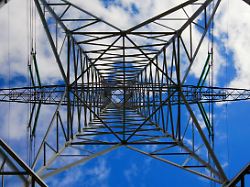Completely independent for the first time
Lithuania detaches itself from the Russian power grid
4/23/2023 12:07 p.m
Lithuania wants to synchronize its power grid with Western Europe in order to become independent from Russia. The Baltic states are still part of the Soviet-era network. But Lithuania is successfully testing sole operation.
For the first time, Lithuania operated its power grid alone and completely independently of Russia. For the isolated operation of the grid, the Baltic EU and NATO country interrupted all connections to the Russian power grid for ten hours on Saturday. The test was successful, said the Lithuanian network operator Litgrid.
The test decoupling went unnoticed by the electricity consumer and served to prepare for the planned synchronization of the grid with Western Europe. “Another and extremely important step closer to the day when we will be where we belong – on the European network!” Prime Minister Ingrid Simonyte wrote on Facebook after the successful test. Energy Minister Dainius Kreivys also spoke of a “big step towards energy independence.”
Both politicians had personally seen the test, in which Lithuania’s electricity needs were fully covered by its own generation and imports from Poland and Sweden. According to its own statements, Lithuania stopped its energy imports from Russia completely last year. However, like Estonia and Latvia, it is still part of a common, synchronously switched power grid with Russia and Belarus – the so-called BRELL ring system, which dates back to Soviet times. This means that the Baltic states are more or less connected to the grid of Russia and Belarus and are dependent on Moscow to maintain the stability of their electricity systems – this is considered a security risk in Tallinn, Riga and Vilnius.
The Baltic States had already taken steps in recent years to synchronize the region’s power grid with the rest of continental Europe by 2025. However, Lithuania wants to achieve this goal ahead of schedule and faster than planned – and is therefore conducting the test on its own. Estonia and Latvia did not take part – the network operators of the two countries stated that they were not yet technically ready for this.
